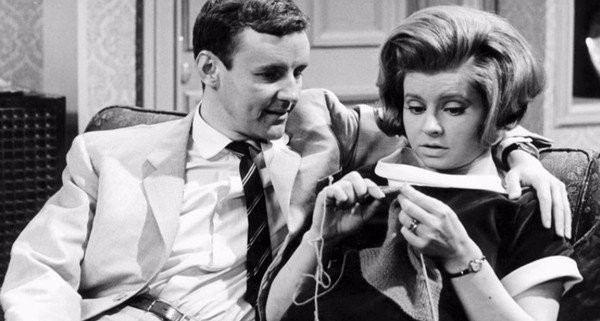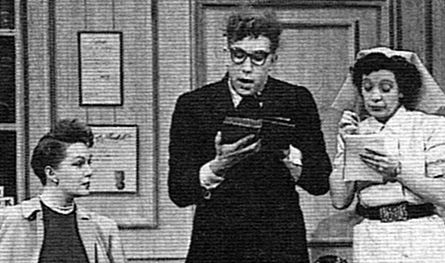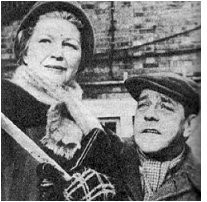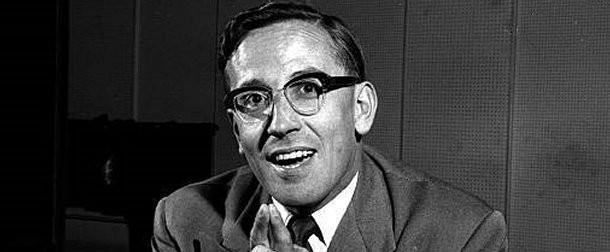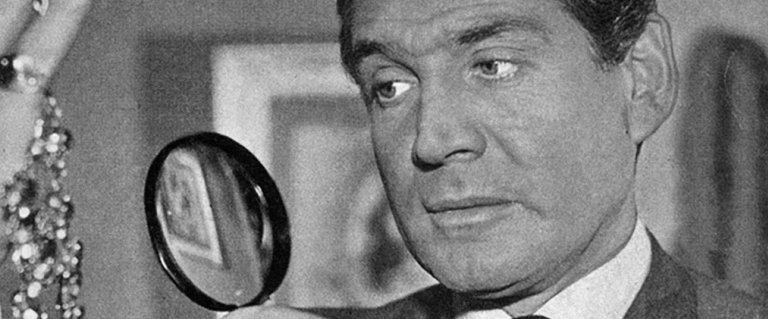
Dinner for One (Der 90. Geburtstag)
1963 - GermanyOriginating as a traditional British music-hall sketch, Dinner for One, originally filmed in 1962, has become essential viewing every Christmas across Europe. Well, everywhere except Britain.
The sketch, which was written by Laurie Wylie, was first played on stage by Freddie Frinton and May Warden in Britain’s end-of-the-pier theatres across numerous seaside resorts. Although the origins of the sketch are unclear, it was most likely written for Freddie Frinton, who inherited the rights for it in 1951, after Wylie’s death. He was still performing it in 1962 when a visit to a Blackpool theatre by German entertainer Peter Frankenfeld and director Heinz Dunkhase, were to sow the seeds of its immortality.
Immediately taken by the simplicity of the sketch and Freddie Frinton’s hilarious performance of a man gradually getting more and more inebriated, Frankenfield invited both Frinton and Warden to travel to Germany to perform it live on his own variety show. It went down so well with the viewing audience that the following year the two performers were invited back to make a recording. On 8 July 1963, the sketch was laid to videotape at the Theater am Besenbinderhof, Hamburg, by the German TV broadcaster, Norddeutscher Rundfunk (NDR) in front of a live audience. The sketch was extremely well received, especially by production assistant Sonja Göth, who can be heard shrieking with laughter all the way through.
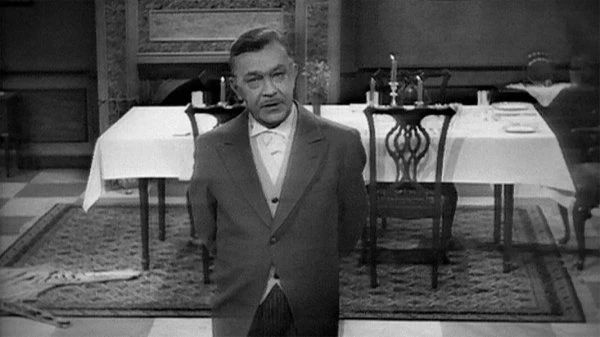
Titled Der 90. Geburtstag (The 90th Birthday), the short 18-minute film is introduced by Heinz Piper, who makes an error by quoting the line 'same procedure as every year' wrongly. It was later overdubbed with the correct line (“same procedure as last year”) before Frinton, dressed as a James, a dithering butler, appears - laying plates on a large dining table in readiness for a dinner party. The host of the dinner party is Miss Sophie (Warden). She has hosted the same dinner party for the same guests for a number of years, in spite of the fact that she has now outlived them all!

When she appears and takes her place at the head of the table James makes his way around it serving each of the absent guests in turn: Sir Toby, Mr Winterbottom, Admiral von Schneider and Mr Pommeroy. Each course of the meal is served with a drink, which James must consume. The vital exchange is: "The same procedure as last year, Miss Sophie?"
"The same procedure as every year, James!"
There are four courses to the meal:
Mulligatawny Soup (with sherry)
Haddock (with white wine)
Chicken (with Champagne)
Fruit (with port)
As he drinks each guest's share, he becomes more inebriated and repeatedly trips over a tiger skin on the floor, the head of which he has to negotiate on every trip from the sideboard to the table. The studio had prepared a polar bear skin for the recording, but Frinton, who had his own prop with him, insisted on using that because “if the head was any bigger, I would really trip over it!” With each drink he toasts his mistress in the same fashion that her guests would have. He clicks his heels when impersonating Admiral von Schneider and salutes her with a loud “Skol!” while Mr Winterbottom is portrayed with a broad Yorkshire accent.

Frinton’s performance is a masterclass in comedic timing, choreography, and delivery as he very quickly, but subtly becomes more and more sozzled, barely able to stand by the time he has finished the fourth course, waddling around the table boozily downing each drink – as well as water from a vase.
When the meal has finished, Miss Sophie rises to go to bed. Standing at the foot of the stairs James asks one more time, "By the way, the same procedure as last year, Miss Sophie?"
"The same procedure as every year, James!"
“Well, I’ll do my best!”
The film, which was directed by Heinz Dunkhase, has been shown every year at Christmas for the last 60+ years, and Frinton is deservedly famous -although mainly (but not solely) in Germany, where it is shown multiple times on New Year’s Eve so that everybody can watch it, when it best fits their schedule. In 2003 it aired a total of 19 times on different stations in Germany.
Dinner for One is also a New Year tradition in Scandinavian countries. In 1985, when the Danish television network, DR, decided not to broadcast the sketch, it received so many complaints that it promised to return it the following year, where it has been shown ever since. In 2003, the Danish TV producer Paul Anthony Sørensen directed and produced a documentary about the sketch that included interviews with relatives of Freddie Frinton and May Warden. It was nominated for the Rose d'Or 2004. Since 1980 it has been broadcast in Norway at the same time every year on 23 December. When, in 1992, it was screened 15-minutes early, the television station's switchboard was jammed with complaints. It also goes out in Australia every New Year's Eve and has been shown in South Africa, Austria and Latvia. Despite its almost universal popularity its first national British television airing did not come until Sky Arts broadcast the film on New Year's Eve 2018.
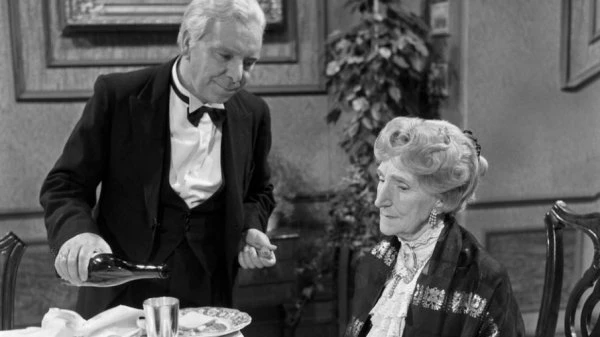
A third, 11-minute version of Dinner for One was recorded by Schweizer Fernsehen (Swiss Television). This version cuts out some of the alcohol drinking as the censors were concerned that it would promote or encourage alcoholism. (It is this version which is commonly found one YouTube). A colour version was planned for filming in late 1968 (a colourised – but not true colour version was made in 1999), but sadly Freddie Frinton died suddenly of a heart attack in October of that year. He was 59 years-old.
Jürgen Meier-Beer, NDR's head of light entertainment says that Dinner for One gets the highest rating of any programme throughout the year. "We have an average market share in our area of 8%. Dinner for One gets us up to 20% to 30% every time. We reckon that one in every two viewers in our area will watch it at some point on New Year's Eve."
May Warden who was 70 years-old when she made Dinner for One had appeared on a number of British television shows in small parts, her longest run being in the 1973-74 sitcom Billy Liar.
Freddie Frinton was born in Grimsby, Lincolnshire in 1909, and was more familiarly known in Britain as Thora Hird’s long suffering husband, Fred, in the hit sitcom Meet the Wife. But success (in the UK) came late in his career. He was 55 by the time he had his breakthrough on primetime television. But around the rest of Europe, he was, and still is, something of a cult figure. Even more remarkable since television’s most famous drunk was, in real life, completely teetotal.
Seen this show? How do you rate it?
Seen this show? How do you rate it?
Published on June 7th, 2021. Written by Laurence Marcus for Television Heaven.


